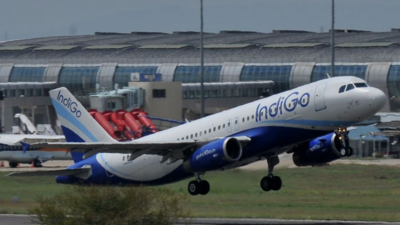
IndiGo, one of Asia’s largest budget carriers, is considering charging passengers for checked-in baggage as the airline braces for a potentially fierce price war in India’s cutthroat air travel market, which is reeling under the worst of COVID-19. After showing signs of recovery.
IndiGo, operated by InterGlobe Aviation Ltd, did not implement the so-called unbundling of fares in February—just before a deadly wave of the pandemic hit India—even as the Directorate General of Civil Aviation ruled that the carrier would start offering zero baggage. and no check-in baggage fare.
Chief executive officer Ronojoy Dutta said in an interview on Tuesday that regulatory caps on Covid-related fares and capacity prevented IndiGo from taking a decision at that time.
Dutta said, ‘We are talking to the government about this. “We’re waiting for everything to settle before locking something.”
IndiGo joins Go Airlines India Ltd, which is looking to establish itself as an ultra-low cost carrier to reduce baggage charges from air tickets. IndiGo’s move to make ticket prices even cheaper will intensify competition among carriers that are known to slash fares so much, and often don’t cover the cost. Crushing price wars have put many airlines out of business in what was one of the world’s fastest growing aviation markets before the pandemic.
revenue rebound
IndiGo is “not likely” to raise funds through share sales to institutional investors as previously planned, with air travel in India recovering from the worst Covid infection, Dutta said. In October India allowed airlines to operate domestically at 100% pre-pandemic capacity, but international flights would remain suspended until at least November 30.
“To be honest, I don’t think we need it now because there isn’t a third wave, and the revenue is coming back,” Dutta said.
Dutta said IndiGo—the world’s biggest customer for Airbus SE’s best-selling A320neo jets—has no intention of flying on routes like London, which require wide-bodied aircraft. While the carrier had been considering wide-body operations for a long time, it has decided that it will not compete with Vistara—a joint venture between Singapore Airlines and the Tata Group—which has been around for a long time as a full-service carrier. Air India is going to have a strong foothold in the market as well, Dutta said.
Nevertheless, IndiGo will expand its international routes faster than domestic to capture the increase in traffic flowing in and out of India within the seven-hour limit, where there are substantial non-stops, including cities including Moscow, Cairo, Tel Aviv. There are no flights. , Nairobi, Bali, Beijing and Manila, Dutta said. He said international routes would account for 40% of the carrier’s capacity over five years, up from the current 25%.
Dutta said India’s low-cost carrier market will be crowded by billionaire investor Rakesh Jhunjhunwala’s new airline Akasa. State-run Air India—which is being sold to the Tata Group—as well as Vistara “have a little space to themselves, which is good, and they’re separated from us” as they operate as a full-service carrier. I am going to work, she said.
FacebookTwitterLinkedinE-mail
,